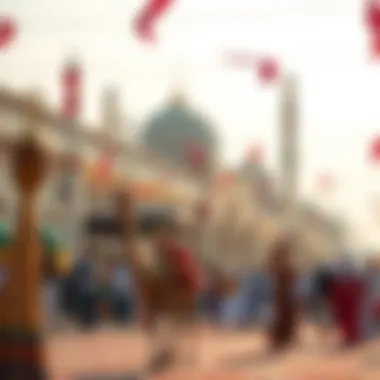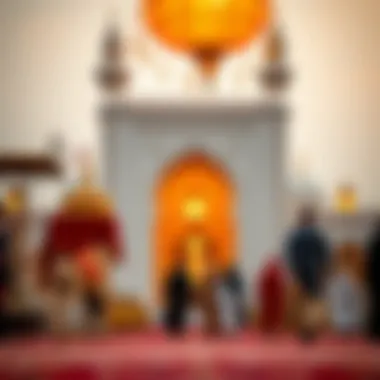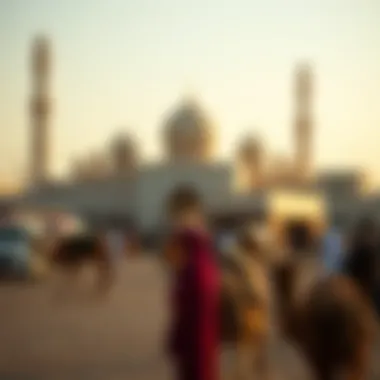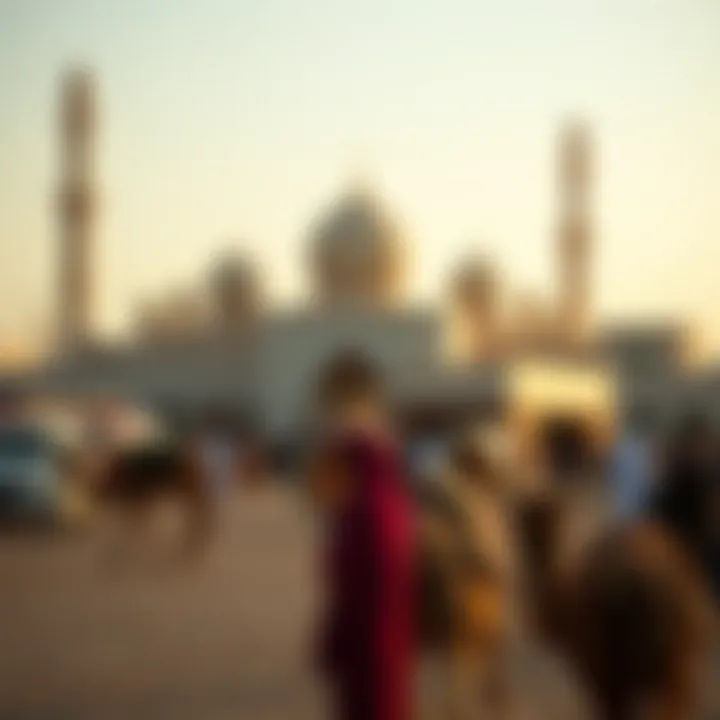Eid Al-Adha Holidays in the UAE: Cultural Insights 2023


Intro
Eid Al-Adha, a significant celebration in Islamic tradition, stands out as one of the most cherished holidays in the UAE. This holiday, which commemorates the willingness of Ibrahim to sacrifice his son, is not just about the spiritual aspect—it’s a robust blend of cultural richness, community bonding, and significant economic influences. In 2023, residents and visitors alike will witness not only days filled with prayer and feasting but also a marked uptick in various sectors of the economy. As families come together to observe traditions and relish festive meals, the implications extend far behind the ceremonial.
In the UAE, this occasion carries weight beyond its religious roots. It stirs interests in travel patterns, commercial activities, and even impacts on real estate within the emirates, particularly in vibrant hubs like Dubai. The anticipation surrounding Eid Al-Adha often sparks shifts in market dynamics, from housing trends to retail revenues. How does this celebration redefine the landscape of commerce, travel, and community life? This exploration aims to dissect those very questions.
This article will navigate through the nuances of this festive period, focusing on key dimensions such as cultural and economic implications. The following sections will delve into specific market analyses, emerging investment opportunities, and delve into particular trends as they relate to holiday celebrations in the UAE. By gaining insights into these emerging trends, we can better understand the multilayered impacts of Eid Al-Adha, culminating in a holistic view of its significance in 2023.
Understanding Eid Al-Adha
The understanding of Eid Al-Adha is crucial when talking about the dynamics it brings within the United Arab Emirates. This holiday, rooted deeply in Islamic tradition, offers a profound opportunity for reflection on sacrifice, charity, and community bonding. Embracing the significance of this occasion allows for deeper insights into how it shapes not just personal lives but also societal structures and economic trends in 2023.
Religious Significance
Eid Al-Adha, often referred to as the "Festival of Sacrifice", is celebrated by Muslims worldwide to commemorate the willingness of Ibrahim (Abraham) to sacrifice his son in obedience to God's command. In the UAE, this event is marked by prayers, community gatherings, and the symbolic act of sacrificing an animal, usually a goat, sheep, or cow. The ritual highlights themes of selflessness and devotion, exemplifying the concept of surrendering one's own desires for a higher purpose.
This day also embodies the principle of charity. The meat from the sacrificed animal is divided into three parts; one third is given to the needy, another is shared with friends and family, and the last third is kept for personal use. This practice underscores the Islamic tenet of helping others, fostering a sense of community and responsibility among families and across neighborhoods. The heart of Eid is not just celebration, but an active participation in supporting and uplifting those less fortunate, which is particularly poignant in the diversity-rich UAE.
Cultural Practices
In the UAE, cultural practices during Eid Al-Adha blend traditional customs with modern societal nuances. Families dress in their finest clothes, often donning new outfits that reflect both Islamic modesty and contemporary fashion trends. Visiting the prayer grounds, or mosque, is a priority early in the morning of Eid; this gathering serves not only for worship but for community bonding.
After prayers, families often partake in festive meals, highlighting a variety of local dishes that showcase Emirati culinary tradition. Dishes such as majboos (a spiced rice dish with meat) and harees (a wheat and meat dish) are staples that grace the table, showcasing the region's flavors and the warmth of home-cooked meals shared among loved ones.
Moreover, it is common for families to engage in exchanging gifts. These gifts, varying from traditional marzipan sweets to modern-day gadgets, reflect the strong ties between relatives and friends, revealing layers of affection and shared joy on this special occasion.
Historical Context
Eid Al-Adha's roots stretch back to the times of the Prophet Muhammad, offering a historical perspective that enriches its modern-day observance. Originally tied to the ancient pilgrimage of Hajj, the festival coincides with the Dhul Hijjah, the twelfth month of the Islamic lunar calendar, symbolizing a moment of unity among Muslims worldwide. In the UAE, the significance of Eid has evolved, intertwining with national identity as the nation continues to forge its uniqueness amidst global influences.
With the establishment of the UAE as a united country in 1971, Eid celebrations instead took on a new meaning. The events reflect a nation's commitment to cultural heritage while also embracing global ideas. Thus, the way Eid Al-Adha is celebrated today carries with it threads of history, combining the essence of Islamic tradition with the pride of a modern state.
Eid Al-Adha is not simply a holiday; it is a tapestry of faith, culture, and history interwoven to form a rich narrative that informs the UAE's identity. Understanding these facets allows individuals to grasp the broader implications of this important holiday in 2023.
Eid Al-Adha in the UAE
The significance of Eid Al-Adha in the United Arab Emirates cannot be overstated. For the Muslim community, this holy festival symbolizes a time for reflection, family, and charity. It stems from profound religious roots, commemorating the willingness of Prophet Ibrahim to sacrifice his son as an act of obedience to God's command. This act is not just a tale but a foundation for the Islamic faith. In the UAE, the observance of Eid Al-Adha becomes a tapestry woven with cultural reverence, economic vitality, and social unity, making it a focal point for both citizens and expatriates.
Public Holiday Schedule
Generally, Eid Al-Adha is observed based on the sighting of the moon, which means the precise dates can shift slightly each year. For 2023, the UAE government has marked the holidays from June 27th to July 3rd. Typically, the day before Eid, known as Arafah Day, is an important time for prayer and reflection for Muslims. Businesses and schools close, allowing families to come together and participate in religious observances. The holiday schedule facilitates an extended break for many, providing opportunities for travel, gatherings, and community events.
Official Announcements
The UAE government often releases communiqués regarding the official dates for Eid holidays, crucial for both locals and international businesses. This year's announcements are expected to come through various official channels, including the Ministry of Human Resources and Emiratisation and local news outlets. These proclamations also emphasize the importance of health and safety protocols, especially in light of recent global health concerns. Citizens typically keep an eye on the news to stay updated on any changes or additions to the holiday schedule.


Unique Traditions in the UAE
Eid Al-Adha in the UAE is rich with distinctive traditions that reflect the country's cultural mosaic. One of the most noteworthy traditions includes the practice of Qurbani, or animal sacrifice, which symbolizes generosity and the spirit of giving. Families often gather for communal prayers at mosques and open spaces, sharing the experience with neighbors and friends.
- Gifts and Feasts: Exchanging gifts is a common practice, with families ensuring they distribute Eidiyah, monetary gifts given to children. Celebratory meals, featuring dishes like lamb pilaf and sweet pastries, are prepared and shared, marking the day with festivity.
- Community Involvement: Many charitable organizations also kick into gear during this time, promoting initiatives to support the less fortunate, such as organizing food drives or community meals.
Economic Impacts of the Holidays
The economic implications of Eid Al-Adha in the UAE are substantial, influencing various sectors and shaping the financial landscape. Understanding these impacts is crucial for investors, homebuyers, and real estate professionals. The holiday not only signifies a time of celebration but also acts as a catalyst for consumer behavior, tourism, and real estate dynamics during this festive season.
Consumer Spending Patterns
During Eid Al-Adha, consumer spending experiences a noticeable uptick. Families prepare for the festivities by purchasing new clothes, gifts, food, and ingredients for traditional meals. Reports suggest that spending can spike anywhere from 20% to 30% compared to regular months.
- Clothing and Accessories: Many families invest in new outfits, often purchasing from high-end retailers and local markets. This surge is not limited to just clothing; accessories including perfumes, shoes, and jewelry see increased sales as well.
- Gifts and Food: The holiday fosters a culture of giving, with many people investing in gifts for family and friends. Additionally, the demand for quality meat, especially sheep and goats for the traditional sacrifice, escalates significantly.
These spending trends not only boost local businesses but also result in an influx of cash flow for the retail sector. With consumer confidence high, businesses prepare for this peak season which provides a much-needed revenue boost.
Tourism Boost
Eid Al-Adha coincides with a noticeable increase in tourism across the UAE. The festive atmosphere draws in tourists eager to experience the rich cultural heritage and celebrations. Major cities like Dubai and Abu Dhabi see an influx of visitors participating in various events, from traditional prayers to lavish public celebrations.
- Hotel Occupancy Rates: Hotels often report higher occupancy rates during this period, as many families and travelers extend their stays to include the holiday. This surge creates opportunities for hospitality investments and enhances the hotel industry’s revenue potential.
- Cultural Events and Activities: Tourists are attracted by unique cultural events that showcase Emirati traditions, thus stimulating local economies. Attractions including mega shopping festivals, fireworks displays, and exhibitions highlight the vibrant life found in the Emirates.
Real Estate Dynamics
The real estate sector also feels the ripple effects of Eid Al-Adha. While many may assume holidays cause stagnation in property transactions, this is not the case in the UAE. The festive mood can encourage investors to close deals and make new purchases.
- Market Sentiment: During Eid, there is often a positive sentiment towards the property market. Investors see it as an optimal time to buy or lease properties, driven by the seasonal demand for housing among families who may look to relocate before the school year starts.
- Rental Trends: Many homeowners engage in short-term rentals during the holiday period, influencing the dynamics of the rental market. Whether it be allocated housing for relatives visiting for celebrations or increased demand for vacation rentals, this can significantly affect rental prices.
- Post-Eid Opportunities: As the holiday wraps up, economic patterns shift and property values can stabilize or rise based on demand. Observing post-Eid trends can provide insights into future investment opportunities, optimizing the timing for real estate transactions.
Travel Trends During Eid Al-Adha
The travel trends during Eid Al-Adha reflect a unique blend of tradition and modernity in the UAE. As one of the pivotal events in the Islamic calendar, these holidays often see a noticeable surge in both domestic and international travel. This is not only significant for those celebrating, but it also has profound implications for various sectors, particularly tourism and real estate.
Domestic Travel Patterns
During the Eid Al-Adha holidays, many families in the UAE take the opportunity to travel domestically. Popular destinations like Dubai, Abu Dhabi, and Sharjah experience an influx of residents who opt for staycations or visits to relatives. The spirit of togetherness encourages locals to support their neighboring emirates.
- Road Trips: Families often pack their cars and hit the road, exploring the stunning landscapes and cultural attractions within the country. Weekend getaways to places like Fujairah or Al Ain become common as people seek a change of scenery without venturing too far from home.
- Hospitality Sector Boom: Hotels and resorts benefit greatly from this trend, with many reporting full bookings weeks in advance. Special Eid packages and activities designed for families are often a hit, providing entertainment and culinary experiences that cater to all ages.
International Travel Perspectives
For many Emiratis and expatriates, Eid Al-Adha marks an opportune moment for long-haul travel as well. The holidays provide a break in work schedules, making it easier for families to travel abroad. There are several characteristics of this trend:
- Popular Destinations: Countries like Turkey, Malaysia, and the Maldives attract travelers looking to enjoy lengthy vacations. These spots are not only known for their beautiful landscapes but also for their cultural significance, aligning well with the spirit of Eid.
- Advance Bookings: Travelers often plan months ahead, with flight tickets and accommodations seeing an uptick in early bookings. Travel agencies promote exclusive packages during this season, helping families make the most of their holiday.
Preferred Destinations


The choice of travel destinations during Eid Al-Adha showcases a range of preferences influenced by cultural ties and leisure pursuits. Understanding these trends can be beneficial for businesses looking to cater to travelers.
- Cultural Heritage: Many families prefer destinations that resonate with their heritage. For instance, visiting Islamic historical sites in Egypt or Jordan becomes attractive during this period. Families plan trips that include educational aspects, sparking a connection with their background.
- Leisure: Conversely, some travelers prioritize relaxation. Luxurious resorts in places like Bali or the Seychelles are favored by those looking to unwind. Offering spa treatments and children's activities, these locations market heavily during the Eid season to attract families eager for leisure.
"Traveling during Eid Al-Adha allows families to bond and explore traditions together, enhancing the holiday experience beyond just the local celebrations."
The trends in travel during Eid Al-Adha in the UAE provide rich insight into the economy and cultural practices. Observing the shifts in domestic and international destinations, as well as the popular choices made by families, are vital for stakeholders across various sectors aiming to capitalize on this festive period.
Social Aspects of Eid Al-Adha
Eid Al-Adha, celebrated by millions across the globe, holds a distinct social significance in the UAE. This section delves into the community celebrations, charitable giving, and family gatherings that hallmark this festive period, showcasing how these activities enrich interpersonal relationships and societal bonds.
Community Celebrations
During Eid Al-Adha, the vibrancy of community life comes to the forefront in the UAE. Streets soon become alive with colors, laughter, and the joyous sounds of congregational prayers. People flock to mosques, and public parks often transform into vibrant venues for shared festivities. Residents might witness grand fireworks displays, alongside cultural shows that unite people regardless of their backgrounds. These celebrations reinforce the spirit of inclusivity, as Emiratis and expatriates alike engage in various activities.
Moreover, traditional markets spring to life, showcasing festive merchandise and local delicacies. Venues like Al Seef in Dubai or Souk Al Bahar provide spaces where community members can come together, fostering a sense of belonging. It’s more than just a holiday; it’s a chance for families to bond and for friendships to bloom over sweet treats and shared experiences.
Charitable Giving
Charitable giving, or Zakat as per Islamic teachings, is pivotal during Eid Al-Adha. This act of giving manifests itself greatly during this period, with many individuals and organizations facilitating donations to support those in need. It becomes a profound reminder of the spirit of compassion and generosity.
Challenges During the Holidays
Eid Al-Adha, with its festive atmosphere and significant cultural heritage, brings not just joy but also certain challenges that residents and visitors in the UAE must navigate. Understanding these hurdles is crucial for anyone looking to enjoy the holiday season without any hiccups. Issues such as traffic and congestion, service availability, and economic pressures arise during this time, affecting various aspects of celebration and community engagement. Let’s unpack these challenges one by one.
Traffic and Congestion
During Eid Al-Adha, the streets of the UAE can resemble bustling marketplaces as people head out for prayers, family gatherings, and shopping. Traffic congestion becomes a norm, particularly in urban areas such as Dubai and Abu Dhabi. The day often sees a noticeable spike in the number of vehicles as many families opt for public celebrations, visiting parks or malls to enjoy the festive season.
Traffic jams and long waits can put a damper on the holiday spirit, making pre-planning essential for smooth travels.
To mitigate the stress associated with potential gridlocks, families should consider timing confrontations with peak travel hours, opting for early morning outings. Alternative transportation modes, like the Metro in Dubai, might also spare a bit of hassle. Notably, local authorities often implement strategies to manage this congestion, utilizing traffic management systems to promote safer and more efficient travel.
Service Availability
Eid Al-Adha presents a unique landscape where services, especially in hospitality and retail, experience altered availability. Many businesses close their doors for the occasion, impacting accessibility to essential services. It is common for restaurants and grocery stores to operate on reduced hours or not at all, particularly during the first few days of the holiday.
This can create a scenario where people may find themselves scrambling for last-minute provisions, leading to added stress. Many families may prefer to stock up on essentials well in advance, preventing inconvenience. It also encourages individuals to enjoy the holiday spirit by planning communal iftar meals, sharing the burden of food preparation among friends and family—a practice that can foster deeper community bonds.
Economic Pressures
The economic landscape doesn't remain unscathed during Eid Al-Adha. Consumer spending typically sees a significant uptick as families seek to celebrate the occasion with gifts, travel, and elaborate meals. However, this can create unforeseen economic pressures. For some, the expectations to spend can lead to financial strain, especially in a rapidly changing economic environment.
Investing wisely during this period is imperative, as impulsive spending can result in budgetary pitfalls. Whether it's hunting for bargains or understanding cash flow amidst the holiday fervor, consumers should tread cautiously. Local retailers often provide special promotions, which can relieve some financial pressure while allowing families to partake in the holiday festivities. Ultimately, balancing joy with prudent financial management is vital for enjoying the Eid experience fully.
In summary, while Eid Al-Adha undoubtedly holds immense cultural and spiritual significance, it’s also accompanied by tangible challenges. Navigating traffic, ensuring service availability, and managing economic pressures form an integral part of the holiday experience in the UAE.


Real Estate Sector Effects
Eid Al-Adha holds a significant place in the cultural and economic landscape of the UAE, influencing various sectors, with real estate being one of the most affected. The festive season brings a surge in activities that can reshape the dynamics of the property market, making it essential for stakeholders to understand these effects. From market sentiment to rental trends, and even investment opportunities, Eid Al-Adha serves as quite a catalyst for movements within the real estate sector.
Market Sentiment During Eid
The sentiment in the real estate market during Eid Al-Adha often shifts notably, as various factors come into play. People tend to look for properties either for personal use, such as holiday rentals, or as investment vehicles, driven by the festive mood.
- Buyers are often more inclined to make impulsive decisions, thinking of long-term benefits to enjoy for the upcoming years.
- Sellers might raise their expectations due to the festive spirit, which can sometimes lead to inflated prices.
In 2023, given the ongoing trends in consumer behavior, many analysts expect a positive buzz around property listings. Highlights include greater inquiry rates and an uptick in showings, particularly in popular neighborhoods that see family gatherings and celebrations. However, the anticipation must be tempered with realism, as market saturation can also lead to an overall leveling off of interest once the holiday season comes to a close.
"The days leading to and during Eid can create a unique microcosm of real estate activities, reflecting both seasonal excitement and underlying market conditions."
Rental Trends in Holiday Period
The holiday period of Eid Al-Adha represents a mixed bag for rental trends in the UAE. Traditionally, more families migrate to urban centers, which can place pressure on certain areas, driving up rental demand.
- Short-term Rentals: A noticeable surge in demand for short-term vacation rentals occurs during Eid. Properties near shopping districts or heritage sites like the Sheikh Zayed Grand Mosque particularly attract tourists and residents alike. Websites like Airbnb or local rental agencies can see considerable upticks in bookings.
- Pricing Strategies: Owners of rental properties may adjust their pricing strategies, opting for higher rates to align with the demand, especially for those properties more favorable in location and amenities.
During this period, investors may often need to evaluate whether they can capitalize on these trends or if they risk alienating potential long-term tenants who may be displaced by short-term holiday rentals.
Investment Opportunities Post-Eid
As the celebrations wind down, the real estate market typically witnesses an insightful transition from temporary spikes in demand to more stable investment opportunities. Many potential homebuyers and investors start looking beyond the holiday rush to assess the year ahead.
- Market Analysis: The weeks following Eid provide a window for strategic investment. Individuals and corporations alike begin to analyze market data and trends, often seeking to find undervalued properties that may have remained unpurchased during the festive period.
- Ideal Timing: Post-Eid, the market can sometimes experience a cooling off, which means investors can find more favorable pricing without the added excitement and competition that the Eid holidays typically generate. Moreover, they can focus on properties that showcase long-term value rather than temporary hype.
For those in the UAE's real estate sector, understanding these ebbs and flows, especially in relation to cultural events like Eid Al-Adha, can provide significant advantages. Overall, stakeholders are encouraged to be discerning and informed while navigating this fascinating space, leveraging the unique moments that Eid presents.
Ending
As this article draws to a close, it's essential to reflect on the multifaceted implications of Eid Al-Adha in the UAE for 2023. The significance of this holiday extends far beyond the traditional observances; it resonates through various sectors and societal layers, shaping community bonds, economic activities, and cultural expressions.
Eid Al-Adha is not merely a time for ritual sacrifice and prayer; it is an opportunity for families and communities to come together. This period emphasizes unity and compassion, fostering an environment ripe for charitable actions and social gatherings. Such dynamics are crucial in a rapidly changing society, where the need for social cohesion remains paramount.
From an economic standpoint, the holiday acts as a catalyst for consumer spending, stimulating local businesses and potentially attracting tourists seeking to experience the UAE's vibrant culture during this festive time. Understanding these patterns can offer invaluable insights for investors, real estate professionals, and policymakers as they navigate these shifting landscapes.
To capture the essence of Eid Al-Adha, one must recognize that it serves as both a spiritual anchor and an economic driver, impacting lives in ways that can go unnoticed day-to-day.
Ultimately, a nuanced grasp of these elements equips stakeholders—from homebuyers exploring new neighborhoods to analysts monitoring economic trends—with the foresight needed to make prudent decisions. By recognizing the holidat’s diverse impacts, we can begin to appreciate Eid Al-Adha not just as a moment in time, but as a significant contributor to the fabric of UAE society.
Summary of Key Points
- Cultural Significance: Eid Al-Adha is central to Islamic faith. It strengthens community and family bonds.
- Economic Impact: The holiday boosts consumer spending and tourism, crucial for local businesses.
- Unique Traditions: The UAE observes distinct customs that reflect its rich cultural tapestry during Eid.
- Social Engagement: Charity during this period demonstrates the generosity and solidarity characteristic of local communities.
- Real Estate Trends: The festive spirit can influence property market dynamics, offering opportunities for investors.
Looking Ahead
As we move forward, the future of Eid Al-Adha in the UAE will likely continue to evolve amid a backdrop of changing demographics and economic landscapes. It poses an invitation to all stakeholders to adapt and innovate.
- Increased Awareness: Homebuyers and investors should pay attention to evolving consumer behavior during holidays, which could affect property investments.
- Real Estate Potential: Recognizing trends in rental demand during festive periods can guide real estate strategies.
- Cultural Integration: As globalization continues to influence local customs, understanding and appreciating diverse cultural practices will be crucial for harmonious community living.
As we approach the next celebrations in subsequent years, Eid Al-Adha will remain a focal point for reflection, unity, and economic activity—an occasion that blends the sacred with the practical.



